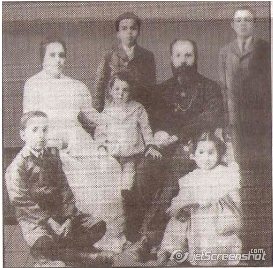Volbrecht Nagel

Volbrecht Nagel (1867 — 1921) was a German missionary to the Malabar coast of India. Initially associated with the Evangelical Lutheran Church, he later joined the Plymouth Brethren, and is remembered now as a pioneer of the Kerala Brethren movement.
Family background
Volbrecht Nagel was born on 3 November 1867 in Hesse, North German Confederation. He grew up in a religious family, but lost his parents at a young age. At the age of 18, Nagel claimed to have been born again after hearing the gospel from a cobbler turned itinerant preacher. With a desire to be a missionary, he moved to Basel, Switzerland and joined the Basel Mission Training Institute in 1886 and graduated in 1892. He was ordained in the Evangelical Lutheran Mission in 1893.
In April 1897, Nagel married Harriet Mitchell, an Anglo-Indian who was a teacher at Kunnamkulam. They had five sons and two daughters. One son and one daughter died in early childhood. Harriet Nagel died on 27 January 1935.[1]
Christian ministry
Nagel came to Cannanore, on the Malabar Coast as a Reverend in December 1893. He became the head of the Basel Mission center in Vaniankulam. The burden of running the schools, and the small scale industries of the Basel Mission in Vaniankulam became a stumbling block in his goal of independent ministry. In 1896, he left the Lutheran Church and Vaniankulam and went south without an aim. On his trip, he saw a prayer center in Kunnamkulam and met Paramel Itoop, a new believer. He decided to start his work at Kunnamkulam, an ancient bastion of Christianity in India.
To be part of the local community, he learned Malayalam. The community in Kunnamkulam received him as one of their own, as he wrote, and spoke in Malayalam. A few months later, they went to the Nilgiris and met the English Brethren Missionary, Handley Bird. The following June, Nagel was baptized by immersion by Bird at Coimbatore. In 1906, he started an orphanage and a home for widows at Nellikunnu near Thrissur City, named Rehoboth which still stands today.[2]
In 1914, Nagel traveled back to his native Germany. His plan was to send his older children to England for education and return to India in 6 months, but the beginning of World War I prevented his return. As a national of the German Empire, he could not enter British administered Malabar. In 1914, he moved to Switzerland. Harriet and three children were back in Malabar Coast, while the two older children were in England. The letter he sent to the assembly fellowship in Paravur[disambiguation needed] four years prior to his death reflects the hunger in his heart for souls in Malabar. That letter contained the following words, “My sweetest treasures are in India. My heart belongs to there". But his desire was not fulfilled. He suffered from palsy and became bedridden. While teaching at Weidenest Bible School, Nagel had a stroke and died on 12 May 1921 and was buried there. Harriet was able to reach Germany and take care of him.
His writings
In 1898, Nagel wrote a book called Christian Baptism. He wrote many songs and hymns in Malayalam that are sung even today by all Christian denominations. Nagel is regarded with great esteem by the Malayalee Christian community for all his work in bringing the Gospel to Kerala.
Malayalam hymns
Nagel's mother tongue was German. He became fluent in Malayalam and composed hymns in that language, which are still used in church services.
A few of the hymns in Malayalam and their translations in English are given below:
- Snehathin Idayanam Yesuway; Wazhium sathyaum nee mathremay ... (Jesus the loving shepherd, you are the only way, and the truth …)
- Ninnodu Praarthyppan Priya Pithaway ... (Our dear father we are coming for prayer ... ) – Prayer song.
- Jayam jayam Kollum Naam, Jayam Kollum Naam ... ( Victorious, victorious we will be victorious ... ) – Victory song.
- Deivathinte æka putren paapikale rakshippan ... (God's only son, died on the cross to save the sinners) – Christ's passion and death
- Maranam jayicha veera ... (Hero, that won over death ...) – Resurrection.
- Yesu varum vegathil – Aswaasamay ... (Jesus will be coming soon ... ) – Second Coming.
- Ente Jeevanam Yesuway ... (Jesus my life ... ) – Comfort.
- Samayamam rathathil njaan swerga yathra cheyyunnu ... (In the chariot of time I am on my homeward journey ...)
His translations include -
- Papakadam theerkuvan ... (What can wash away my sins) by Robert Lowry
- Yeshu enn swanatham, Hallelujah ... (Blessed Assurance) by Fanny Crosby
- Yeshuvin thirupadathil irunnu kelka naam ... (Sing them over again to me) by P.P. Bliss
- Kristhuvinte daanam ethra maduram ... (Like a river glorious)
See also
References
- ^ http://www.holypal.com/profiles/blogs/v-nagel-missionary-to-gods-own
- ^ "The Story of Volbrecht Nagel". July 24, 2010. Retrieved December 4, 2014.
- Mahakavi K. V. Simon (1999). "16". Workers. pp. 336–341 in the 1999 edition. [This book was first published in November 1938 (Malayalam Era Thulam 1114), Thulam, and re-published by Sathyam Publications, Tiruvalla, Kerala, India in February 1999.]
- T. E. Easow. Brethren Prasthanam Logamegum. (in Malayalam) 1981.
'Turning the World Upside Down' A century of Missionary Endeavour Pub 1972 Echoes of Service 1, Widcombe crescent, Bath, Somerset.
